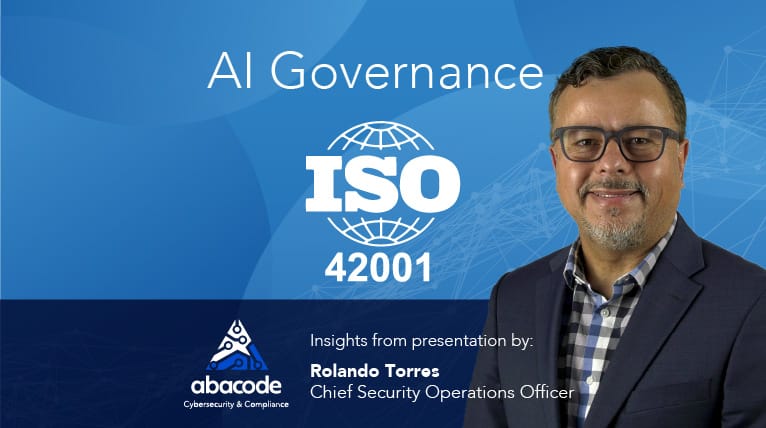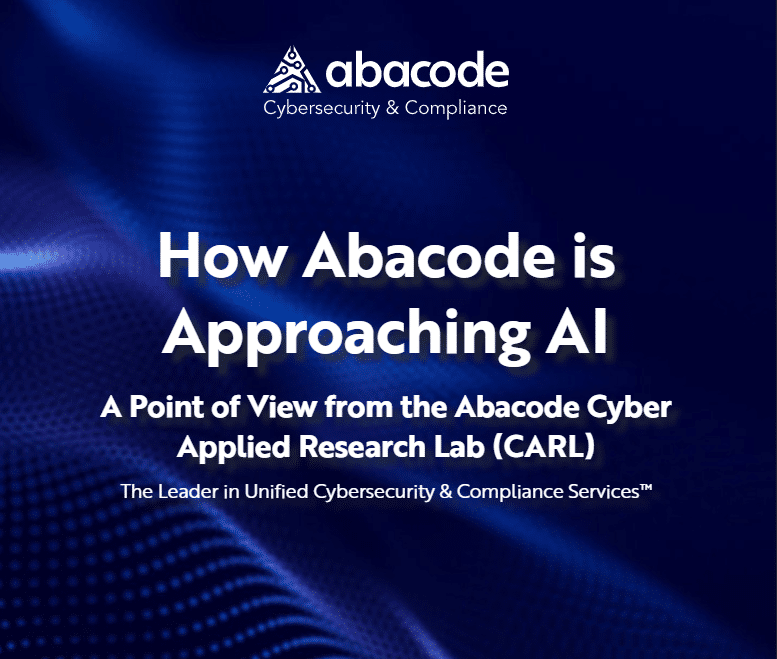Overview from presentation by Rolando Torres
Artificial Intelligence is no longer a buzzword—it’s a business imperative. But as organizations race to adopt AI tools and platforms, many are asking the same critical question: How do we govern AI responsibly while still driving innovation?
At Abacode, we believe the answer lies in strategic governance, risk awareness, and alignment with emerging standards like ISO 42001. In a recent expert-led session, our Chief Security Operations Officer, Rolando Torres, shared practical insights on how organizations can harness AI effectively—without compromising security, compliance, or operational integrity.
Why AI Governance Is a Business Priority
AI is transforming everything from customer service to cybersecurity. But with great power comes great responsibility. Rolando emphasized that AI governance is not just a technical issue—it’s a business issue. Poorly governed AI can lead to:
- Operational disruptions (e.g., failed chatbots or automation errors)
- Privacy violations
- Reputational damage
- Regulatory non-compliance
One of the most compelling points made: AI decisions are hard to reverse. If you replace human roles with AI and the system fails, you can’t just “undo” that decision overnight. Rehiring, retraining, and rebuilding trust takes time—something most businesses can’t afford during a crisis.
ISO 42001: The New Standard for AI Management
To help organizations navigate this complex landscape, the ISO 42001 standard was introduced. It’s the first international framework specifically designed for AI management systems, and it provides a structured approach to:
- Assigning roles and responsibilities for AI oversight
- Ensuring transparency and accountability in AI decision-making
- Aligning AI use with ethical, legal, and operational standards
- Managing risks associated with autonomous and agentic AI systems
Rolando stressed that AI governance must be intentional. Not every innovation team is equipped to handle AI’s unique challenges. Organizations need dedicated AI governance roles and cross-functional collaboration between IT, legal, compliance, and business units.
Key Questions Answered
1. What should we ask our vendors about AI governance and policies?
Start by asking:
- What AI systems or models are being used?
- How are decisions made and audited?
- What safeguards are in place for bias, privacy, and failure scenarios?
- Are they aligned with ISO 42001 or similar governance frameworks?
These questions help ensure your vendors are not just using AI—but using it responsibly.
2. What’s a good first step toward an AI-aware cybersecurity program?
Begin with a risk assessment that includes AI-specific threats. Understand where AI is being used in your environment (internally and externally), and evaluate:
- Data privacy implications
- Model integrity and explainability
- Potential for adversarial attacks
From there, build policies and controls that integrate AI into your broader cybersecurity and compliance strategy.
3. How do we pitch AI governance to the board in terms of ROI?
Frame AI governance as risk reduction and value protection. Highlight how:
- Proper governance prevents costly failures and reputational damage
- Standards like ISO 42001 improve trust with customers and regulators
- AI can drive efficiency—but only if deployed safely and sustainably
It’s not just about innovation—it’s about resilient innovation.
Turn Compliance into Confidence
Discover how Abacode’s Continuous Compliance solutions help you stay audit-ready, reduce risk, and align with evolving regulatory demands.






